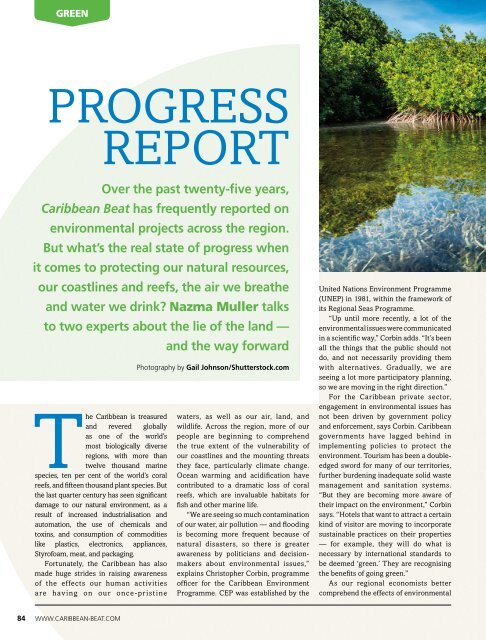Caribbean Beat — 25th Anniversary Edition — March/April 2017 (#144)
A calendar of events; music, film, and book reviews; travel features; people profiles, and much more.
A calendar of events; music, film, and book reviews; travel features; people profiles, and much more.
Create successful ePaper yourself
Turn your PDF publications into a flip-book with our unique Google optimized e-Paper software.
GREEN<br />
Progress<br />
report<br />
Over the past twenty-five years,<br />
<strong>Caribbean</strong> <strong>Beat</strong> has frequently reported on<br />
environmental projects across the region.<br />
But what’s the real state of progress when<br />
it comes to protecting our natural resources,<br />
our coastlines and reefs, the air we breathe<br />
and water we drink? Nazma Muller talks<br />
to two experts about the lie of the land <strong>—</strong><br />
The <strong>Caribbean</strong> is treasured<br />
and revered globally<br />
as one of the world’s<br />
most biologically diverse<br />
regions, with more than<br />
twelve thousand marine<br />
species, ten per cent of the world’s coral<br />
reefs, and fifteen thousand plant species. But<br />
the last quarter century has seen significant<br />
damage to our natural environment, as a<br />
result of increased industrialisation and<br />
automation, the use of chemicals and<br />
toxins, and consumption of commodities<br />
like plastics, electronics, appliances,<br />
Styrofoam, meat, and packaging.<br />
Fortunately, the <strong>Caribbean</strong> has also<br />
made huge strides in raising awareness<br />
of the effects our human activities<br />
are having on our once-pristine<br />
and the way forward<br />
Photography by Gail Johnson/Shutterstock.com<br />
waters, as well as our air, land, and<br />
wildlife. Across the region, more of our<br />
people are beginning to comprehend<br />
the true extent of the vulnerability of<br />
our coastlines and the mounting threats<br />
they face, particularly climate change.<br />
Ocean warming and acidification have<br />
contributed to a dramatic loss of coral<br />
reefs, which are invaluable habitats for<br />
fish and other marine life.<br />
“We are seeing so much contamination<br />
of our water, air pollution <strong>—</strong> and flooding<br />
is becoming more frequent because of<br />
natural disasters, so there is greater<br />
awareness by politicians and decisionmakers<br />
about environmental issues,”<br />
explains Christopher Corbin, programme<br />
officer for the <strong>Caribbean</strong> Environment<br />
Programme. CEP was established by the<br />
United Nations Environment Programme<br />
(UNEP) in 1981, within the framework of<br />
its Regional Seas Programme.<br />
“Up until more recently, a lot of the<br />
environmental issues were communicated<br />
in a scientific way,” Corbin adds. “It’s been<br />
all the things that the public should not<br />
do, and not necessarily providing them<br />
with alternatives. Gradually, we are<br />
seeing a lot more participatory planning,<br />
so we are moving in the right direction.”<br />
For the <strong>Caribbean</strong> private sector,<br />
engagement in environmental issues has<br />
not been driven by government policy<br />
and enforcement, says Corbin. <strong>Caribbean</strong><br />
governments have lagged behind in<br />
implementing policies to protect the<br />
environment. Tourism has been a doubleedged<br />
sword for many of our territories,<br />
further burdening inadequate solid waste<br />
management and sanitation systems.<br />
“But they are becoming more aware of<br />
their impact on the environment,” Corbin<br />
says. “Hotels that want to attract a certain<br />
kind of visitor are moving to incorporate<br />
sustainable practices on their properties<br />
<strong>—</strong> for example, they will do what is<br />
necessary by international standards to<br />
be deemed ‘green.’ They are recognising<br />
the benefits of going green.”<br />
As our regional economists better<br />
comprehend the effects of environmental<br />
84 WWW.CARIBBEAN-BEAT.COM


















